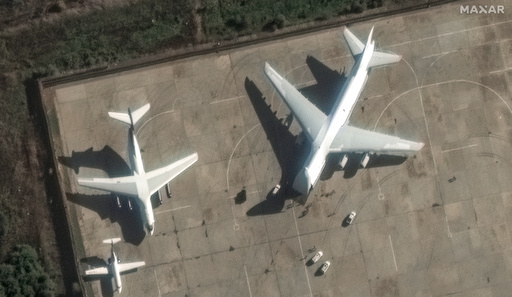Thousands of Syrians gathered in the primary square of Damascus and in a historic mosque to partake in the first Muslim Friday prayers following the overthrow of former President Bashar Assad, marking a pivotal moment in the country’s shifting power dynamics. The rebel factions are now focused on establishing a secure environment and initiating a political transition after taking control of the capital on Sunday.
In a significant regional diplomatic effort, U.S. Secretary of State Antony Blinken made an unexpected visit to Iraq, aiming to unify Middle Eastern countries in support of a peaceful political transition in Syria. This trip is part of Blinken’s twelfth visit to the region since the outbreak of the Israel-Hamas conflict last year, though it is his first since the ousting of Assad.
Meanwhile, the United States is intensifying efforts for a ceasefire in Gaza, where ongoing conflict has resulted in a dire humanitarian crisis for over 2 million Palestinians.
According to the Gaza Health Ministry, the conflict has claimed over 44,800 Palestinian lives, with more than half being women and children, although the ministry does not specify how many were combatants. The Israeli military claims to have neutralized more than 17,000 militants, yet no evidence has been provided to support this.
The October 2023 Hamas attack, which instigated this conflict, resulted in approximately 1,200 fatalities in Israel, mostly among civilians, with around 250 individuals taken hostage. Current estimates suggest that around 100 hostages remain in Gaza, with at least a third presumed deceased.
In the latest developments, Syria’s interim government urged the United Nations Security Council to prompt Israel to cease its military operations within Syrian territory, which they assert violates the 1974 Disengagement Agreement. In letters sent to the council and the UN Secretary-General, Syria’s ambassador stated he was acting on directives from his government, marking the first official communication from the new interim government after the removal of Assad.
These communications were sent soon after transitional leaders took power, emphasizing the need for Syria to reclaim its territories from Israeli control, which includes parts of Mount Hermon and the Quneitra Governorate. The letters highlight the aspirations of the Syrian people to achieve an era of freedom and the rule of law.
The Israeli military still occupies the Golan Heights, a region seized during the 1967 Middle East war. The 1973 Disengagement Agreement provided for a demilitarized zone monitored by a UN peacekeeping force.
In parallel, Turkey’s Foreign Minister declared that eliminating the U.S.-supported Kurdish militia, known as the YPG, remains Turkey’s strategic goal. In an interview, he underscored that Syrian rebels, now in control of Damascus, would not endorse the YPG, which is allied with the U.S. against the Islamic State group but considered a terrorist organization by Turkey.
Hakan Fidan specifically called for the foreign YPG members to exit Syria and the remaining fighters to lay down their arms for peaceful coexistence in the region. He also revealed Turkey’s diplomatic discussions with Iran and Russia to prevent military intervention during the insurgents’ advance against Assad.
On the humanitarian front, the situation in Gaza is worsening amid increased airstrikes, leading to a severe impediment of aid deliveries. U.N. coordinator Muhannad Hadi made an appeal for adherence to humanitarian principles while criticizing the recent looting of aid convoys aimed at assisting the besieged area.
In Syria, Israeli airstrikes were reported in multiple locations, signaling that despite the regime change, Israel continues its operations against various military sites and perceived threats.
Additionally, Russian military forces were seen withdrawing from southern regions of Syria, raising speculations regarding Russia’s continued influence in the region following the downfall of its ally Assad. Significant military convoys have been observed heading north toward Latakia, where Russia’s primary base is located.
Turkey also announced plans to reopen its embassy in Syria for the first time since 2012. This move reflects the changing political landscape in Syria and Turkey’s role in assisting the insurgent groups that contributed to Assad’s ouster.
In further news, an American citizen who had been imprisoned in Syria was successfully evacuated by U.S. military forces following a recent release of prisoners by the rebels. Travis Timmerman shared details of his captivity and eventual release in a harrowing escape from a notorious detention facility.
In legal developments, a Dutch court dismissed a lawsuit from human rights organizations aimed at blocking arms sales to Israel, citing sufficient existing regulations to comply with international law. The court argued that it is not within its jurisdiction to dictate the government’s foreign policy.
Israeli military operations in northern Gaza remain devastating, with recent attacks on hospitals injuring medical staff and damaging facilities. The Israeli military has faced accusations of hindering humanitarian aid while inflicting significant casualties on civilian populations.
In conclusion, Blinken’s visit to Iraq was part of a broader strategy to stabilize Syria following Assad’s removal, as he discussed the importance of a collaborative approach for Syria’s future with officials in different nations. His discussions focused on ensuring regional security and fostering an inclusive political transition, while Turkey expressed its readiness to contribute positively to the evolving situation in Syria.



